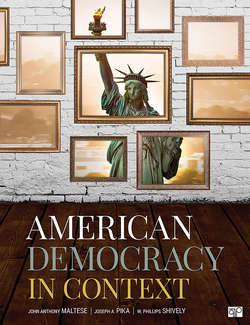Читать книгу American Democracy in Context - Joseph A. Pika - Страница 55
На сайте Литреса книга снята с продажи.
The Magna Carta
ОглавлениеThe Magna Carta (which means “great charter” in Latin, the language in which it was written) dates to 1215, when King John (ruler of England from 1199 to 1216) was forced to sign it by English barons who had revolted after John had imposed heavy taxes, waged an unsuccessful war with France, and quarreled with the Pope. It is one of the great documents in Western civilization, and its articulation of rights strongly influenced the framers of the U.S. Constitution.
The Magna Carta was a practical document designed to remedy specific abuses of King John, so it includes many provisions (or “chapters”) that are not so relevant today. Others, however, stand as a fundamental basis for the rule of law—the idea that even the most powerful leader of government is bound by the law. The most important of these is Chapter 39, which emphatically states the requirement of due process of law, or of fair procedures:
No free man shall be seized or imprisoned, or stripped of his rights or possessions, or outlawed or exiled, or deprived of his standing in any other way, nor will we proceed with force against him, or send others to do so, except by the lawful judgment of his equals or by the law of the land.5
This provision of the Magna Carta limited the power of kings and later served as the basis for the guarantees in the U.S. Constitution that the government shall not take a person’s life, liberty, or property without due process of law. Modern-day Miranda warnings are an outgrowth of this.
Description
This Miranda warning card, developed for Kansas City police officers, is intended to ensure Americans’ due process rights.
Mikael Karlsson / Alamy Stock Photo
The fact that King John was forced to sign this document set an important precedent of free men standing up to the king. In 1297, the Magna Carta was placed in the statute books of England, where it remains to this day. By the end of the fourteenth century, the Magna Carta had come to be viewed not as any ordinary statute but as the fundamental law of the realm. Thus, opponents of King Charles I used it to justify rebellion in 1642.
